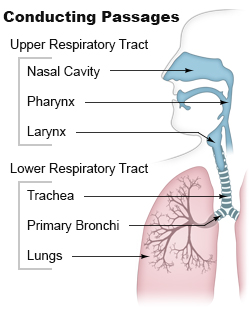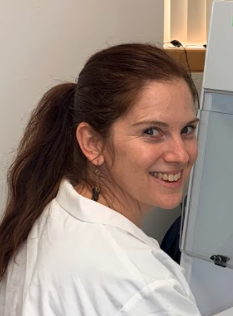A bronchodilator or broncholytic is a substance that dilates the bronchi and bronchioles, decreasing resistance in the respiratory airway and increasing airflow to the lungs. Bronchodilators may be originating naturally within the body, or they may be medications administered for the treatment of breathing difficulties, usually in the form of inhalers. They are most useful in obstructive lung diseases, of which asthma and chronic obstructive pulmonary disease are the most common conditions. They may be useful in bronchiolitis and bronchiectasis, although this remains somewhat controversial. They are often prescribed but of unproven significance in restrictive lung diseases.
Parasitic pneumonia is a type of pneumonia caused by parasites. Pneumonia is an inflammatory condition of the lungs, most commonly caused by bacteria or viruses. Parasites are an uncommon cause of pneumonia, usually affecting immunocompromised individuals or those in underdeveloped countries. In developed countries, it is most common to see parasitic pneumonia in immigrants or recently returning travelers. In recent years, improved hygiene and global socioeconomic conditions have decreased the prevalence of parasitic pneumonias, but susceptibility is increasing due to increased travel, urbanization, and population of immunocompromised individuals.

Airway obstruction is a blockage of respiration in the airway that hinders the free flow of air. Airway obstructions can occur either in the upper airway (UPA) or lower airway (LOA). The upper airway consists of the nose, throat, and larynx. The lower airway comprises the trachea, bronchi, and bronchioles.

Bronchoscopy is an endoscopic technique of visualizing the inside of the airways for diagnostic and therapeutic purposes. An instrument (bronchoscope) is inserted into the airways, usually through the nose or mouth, or occasionally through a tracheostomy. This allows the practitioner to examine the patient's airways for abnormalities such as foreign bodies, bleeding, tumors, or inflammation. Specimens may be taken from inside the lungs. The construction of bronchoscopes ranges from rigid metal tubes with attached lighting devices to flexible optical fiber instruments with realtime video equipment.
Pulmonary rehabilitation, also known as respiratory rehabilitation, is an important part of the management and health maintenance of people with chronic respiratory disease who remain symptomatic or continue to have decreased function despite standard medical treatment. It is a broad therapeutic concept. It is defined by the American Thoracic Society and the European Respiratory Society as an evidence-based, multidisciplinary, and comprehensive intervention for patients with chronic respiratory diseases who are symptomatic and often have decreased daily life activities. In general, pulmonary rehabilitation refers to a series of services that are administered to patients of respiratory disease and their families, typically to attempt to improve the quality of life for the patient. Pulmonary rehabilitation may be carried out in a variety of settings, depending on the patient's needs, and may or may not include pharmacologic intervention.
Vectura Group Limited is a British pharmaceuticals company based in Chippenham, England which develops inhaled medicines and makes inhaler devices. The company was listed on the London Stock Exchange until it was acquired by Philip Morris International in September 2021.
Heather J Zar is a South African physician and scientist specialising in the care of children with respiratory diseases like asthma, tuberculosis and pneumonia.

Matire Louise Ngarongoa Harwood is a New Zealand clinical researcher and trainee general practitioner. She is an associate professor at the University of Auckland. Harwood was the 2017 New Zealand L'Oréal UNESCO For Women in Science Fellow. Her expertise is in Māori health, focussed on reducing health inequity by improving indigenous health and well-being.
Francesco Blasi is an Italian Medical scientist and professor. His domain of research is respiratory medicine. He has been the president of European Respiratory Society (ERS) during 2012–13. He has served as the president of Italian Respiratory Society during 2015–17. He is presently serving as one of the board of directors of University of Milan and is the professor of respiratory medicine in department pathophysiology and transplantation in University of Milan.
Marion Frances Robinson was a New Zealand nutritionist and physiologist. She was professor of nutrition at the University of Otago, and is particularly noted for her investigation of the importance of selenium in the human diet.

Nicola Jane Spurrier PSM is an Australian paediatrician and public health physician who has been the Chief Public Health Officer of South Australia since August 2019.
David R. Murdoch is a New Zealand academic specialising in paediatric infectious diseases, especially pneumonia. He has also worked on Legionnaires' disease and has advised the Oxford University vaccine group and the New Zealand government on COVID-19. Murdoch served as Vice-Chancellor of the University of Otago between February 2022 and June 2023.

Anne Louise Wyllie is a New Zealand microbiologist who was the lead author of a 2020 research article which led to the development of the SalivaDirect PCR method of testing saliva for SARS-CoV-2, the virus that causes COVID-19. She has also worked on community studies to better understand pneumococcal disease. She is a research scientist in epidemiology with the Public Health Modeling Unit at Yale University.
Peter Burney is a British epidemiologist. He is emeritus professor of respiratory epidemiology and public health at the National Heart and Lung Institute, Imperial College London. He is a Fellow of the Academy of Medical Sciences since 2001.
The International Severe Acute Respiratory and emerging Infection Consortium (ISARIC) is an international research initiative based in Oxford, England. It is hosted at the Nuffield Department of Medicine within the University of Oxford and led by the Epidemic diseases Research Group Oxford (ERGO). ISARIC is funded by the Bill & Melinda Gates Foundation, Foreign, Commonwealth and Development Office, and Wellcome Trust.
Patricia Priest is a New Zealand public health scientist and epidemiologist who is Professor of Public Health in Medicine at the University of Otago. Throughout the COVID-19 pandemic, Priest served as an advisor to the New Zealand Ministry of Health. She was awarded an Ig Nobel Prize in 2010. As of 2024 Priest is the Acting Pro-Vice-Chancellor of the Division of Health Sciences at the university.
Jadwiga “Wisia” A. Wedzicha is a British physician and Professor of Respiratory Medicine at the National Heart and Lung Institute. Her research has considered the causes and impact of chronic obstructive pulmonary disease. She was elected as Fellow of the UK Academy of Medical Sciences in 2013 and awarded the Helmholtz International Fellow Award.
Emerita Professor Carol Armour AM is an Australian researcher specialising in asthma. Her research ranged from cellular level investigations to translation of asthma research into the health system. She was a NHMRC Research Committee member and Pro Vice Chancellor, Research, at The University of Sydney, before taking up a position as the Executive Director of the Woolcock Institute in 2012 and retiring in 2024.
Caroline Jane Bell is a New Zealand psychiatry academic, and is a full professor at the University of Otago, specialising in investigating the psychological impacts of trauma. She led the Canterbury District Health Board's response to mental health after the Christchurch earthquakes and led a collaboration on the effects of the Christchurch mosque shootings.
Louise Fleming is a British paediatrician who is Professor of Practice in Paediatric Respiratory Medicine at Imperial College London. Her research looks to improve the lives of children with asthma through applied clinical research and innovation. She is a member of the Science Committee of the Global Initiative for Asthma.





